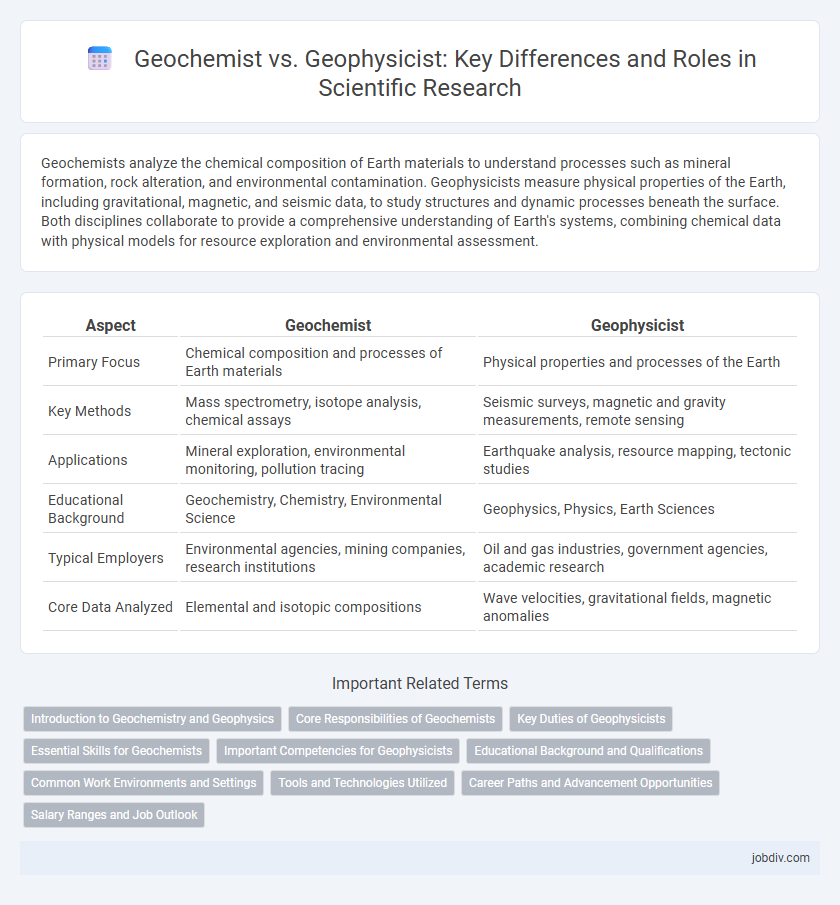Geochemists analyze the chemical composition of Earth materials to understand processes such as mineral formation, rock alteration, and environmental contamination. Geophysicists measure physical properties of the Earth, including gravitational, magnetic, and seismic data, to study structures and dynamic processes beneath the surface. Both disciplines collaborate to provide a comprehensive understanding of Earth's systems, combining chemical data with physical models for resource exploration and environmental assessment.
Table of Comparison
| Aspect | Geochemist | Geophysicist |
|---|---|---|
| Primary Focus | Chemical composition and processes of Earth materials | Physical properties and processes of the Earth |
| Key Methods | Mass spectrometry, isotope analysis, chemical assays | Seismic surveys, magnetic and gravity measurements, remote sensing |
| Applications | Mineral exploration, environmental monitoring, pollution tracing | Earthquake analysis, resource mapping, tectonic studies |
| Educational Background | Geochemistry, Chemistry, Environmental Science | Geophysics, Physics, Earth Sciences |
| Typical Employers | Environmental agencies, mining companies, research institutions | Oil and gas industries, government agencies, academic research |
| Core Data Analyzed | Elemental and isotopic compositions | Wave velocities, gravitational fields, magnetic anomalies |
Introduction to Geochemistry and Geophysics
Geochemistry involves the study of the chemical composition and processes of Earth's materials, analyzing elements and isotopes to understand mineral formation, soil chemistry, and environmental impacts. Geophysics focuses on the physical properties of the Earth, employing techniques like seismic wave analysis, magnetic field measurement, and gravitational studies to investigate subsurface structures and tectonic activity. Both disciplines integrate data to elucidate Earth's dynamic systems, but geochemistry emphasizes chemical interactions while geophysics prioritizes physical phenomena.
Core Responsibilities of Geochemists
Geochemists analyze the chemical composition of earth materials to understand geological processes, including mineral formation, rock alteration, and environmental changes. They collect and interpret data from rock, soil, water, and air samples using techniques like mass spectrometry and chromatography to trace element distribution and isotope ratios. This information supports mineral exploration, environmental monitoring, and assessing the impacts of human activities on geological systems.
Key Duties of Geophysicists
Geophysicists specialize in analyzing the physical properties of the Earth, employing techniques such as seismic, magnetic, and gravitational surveys to explore subsurface structures and natural resources. They interpret geophysical data to assess geological hazards, support oil and gas exploration, and study tectonic activity. Their expertise in data processing and modeling is crucial for understanding Earth's internal processes and guiding environmental and engineering projects.
Essential Skills for Geochemists
Geochemists require strong analytical skills to interpret chemical data from earth materials, utilizing techniques such as mass spectrometry and chromatography. Proficiency in field sampling and laboratory analysis is essential for accurate data collection and environmental assessments. A solid understanding of geochemical cycles, mineralogy, and isotope geochemistry enables geochemists to investigate Earth's chemical processes and contribute to resource exploration and environmental remediation.
Important Competencies for Geophysicists
Geophysicists require strong competencies in data analysis, mathematical modeling, and proficiency with geophysical instrumentation to interpret subsurface structures accurately. Expertise in seismic wave propagation, magnetometry, and gravity measurements is essential for mapping geological formations. Advanced skills in computer programming and GIS software enhance their ability to process complex datasets and develop predictive models.
Educational Background and Qualifications
Geochemists typically hold degrees in chemistry, geology, or earth sciences, with advanced studies emphasizing analytical chemistry and mineralogy. Geophysicists pursue education in physics, mathematics, or engineering, focusing on seismic analysis, electromagnetism, and computational modeling. Both fields often require graduate-level qualifications, such as a master's or PhD, to conduct specialized research and professional practice.
Common Work Environments and Settings
Geochemists and geophysicists often work in research institutions, universities, and government agencies dedicated to earth sciences. Both professionals frequently conduct fieldwork in diverse environments such as mines, volcanic sites, and ocean floors to collect samples and data for analysis. Laboratories equipped with advanced analytical instruments are crucial settings where geochemists analyze chemical properties, while geophysicists use seismic, magnetic, and electrical equipment to interpret subsurface conditions.
Tools and Technologies Utilized
Geochemists primarily utilize mass spectrometers, X-ray fluorescence (XRF), and inductively coupled plasma (ICP) analyzers to analyze the chemical composition of earth materials, enabling precise elemental and isotopic measurements. Geophysicists rely on seismic imaging tools, magnetometers, and ground-penetrating radar (GPR) to investigate subsurface structures and physical properties of the Earth. Both disciplines integrate Geographic Information Systems (GIS) for spatial data interpretation, though their data acquisition technologies differ significantly based on chemical versus physical property analysis.
Career Paths and Advancement Opportunities
Geochemists primarily analyze the chemical composition of earth materials, leading to career opportunities in environmental consulting, mining, and petroleum industries, with advancement focused on specialized research and project management roles. Geophysicists utilize physical principles to study seismic activity, magnetic fields, and gravitational forces, advancing through careers in oil exploration, earthquake risk assessment, and academic research. Both professions offer pathways to leadership positions in government agencies, private sector enterprises, and research institutions, with progression often dependent on advanced degrees and technical expertise.
Salary Ranges and Job Outlook
Geochemists typically earn an average salary ranging from $60,000 to $110,000 annually, with job growth projected at about 6% over the next decade due to increased demand in environmental consulting and resource exploration. Geophysicists generally have a higher salary range between $70,000 and $130,000, driven by opportunities in oil and gas, mining, and government research sectors. The job outlook for geophysicists remains stable with a 5-7% growth rate, reflecting ongoing investments in natural resource management and energy development.
Geochemist vs Geophysicist Infographic

 jobdiv.com
jobdiv.com